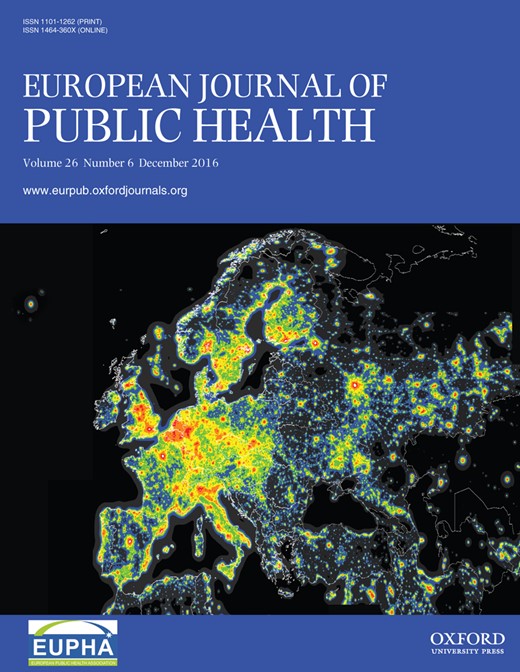-
PDF
- Split View
-
Views
-
Cite
Cite
Charles Agyemang, Lonely and bored stiff: challenging phase for ethnic minority and migrant health in Europe, European Journal of Public Health, Volume 26, Issue 6, December 2016, Pages 898–899, https://doi.org/10.1093/eurpub/ckw112
Close - Share Icon Share
Loneliness has been linked to a range of negative health outcomes. In a recent meta-analysis, loneliness and social isolation were associated with a 29% increased risk of incident coronary heart disease and a 32% increased risk of stroke.1 These findings are consistent with the high prevalence of cardiovascular risk factors such as hypertension, C-reactive protein and dyslipidaemias observed among lonely people.2 Evidence suggests that the prevalence of loneliness differ across cultural groups. Loneliness has shown to be more common in ethnic minority groups than the host populations in Europe.3 The reasons for the high prevalence of loneliness among ethnic minority groups are unclear. Furthermore, studies have not yet assessed the link between loneliness and the poor health outcomes among ethnic minority groups in Europe. Given the strong association between loneliness and poor health outcomes, it is highly plausible that the observed ethnic health inequalities may, in part, be due to the high rate of loneliness in ethnic minority groups. Therefore, reducing loneliness and boosting a sense of connectedness and social adhesion in ethnic minority communities may help to improve their health outcomes and subsequent lead to a reduction in ethnic inequalities in health. The starting point is to identify the key-specific factors that are driving the higher rates of loneliness in ethnic minority groups.
In this issue of the Journal, Visser and El Fakari addressed this topic by assessing whether ethnic differences in emotional and social loneliness are explained by ethnic differences in possible risk factors, such as partnership, health and socioeconomic status using the 2012 Public Health Services data in the four major cities of the Netherlands (Amsterdam, Rotterdam, The Hague and Utrecht). Consistent with the current evidence, they found a higher prevalence of both emotional and social loneliness in all ethnic minority groups than in European origin Dutch (henceforth, Dutch). Interestingly, the observed ethnic differences in loneliness were explained by differences in demographic, economic and social factors such as neighbourhood, not getting along and perceived discrimination. In fact, the ethnic differences did not only disappear, ethnic minority groups were on average less lonely than the Dutch group after these factors had been taken into account suggesting the potential impact of these factors on ethnic inequalities in loneliness. The study findings also show important differences within the ethnic minority groups with the Turkish origin group being the most affected and being more prone to several risk factors for loneliness. In addition, among ethnic minority groups, loneliness cuts across all age groups with Turkish young people being even more lonely than their older peers.
The key limitations to this study include the cross-sectional nature and the low response rates especially in ethnic minority groups as highlighted by the authors. Notwithstanding, the findings are highly relevant for ethnic minority and migrant health. Evidence shows that ethnic minority groups, in general, have worse health outcomes than the European host populations for reasons that are not completely understood.4 Consequently, the explanations for the poor health outcomes among ethnic minority groups have been a subject of constant debate. The strong association between loneliness and poor health outcomes, both being higher in ethnic minority groups, leads to an obvious question of what role does loneliness play in the observed ethnic inequalities in health? This question clearly deserves a proper evaluation in future research.
Loneliness is often assumed to be a problem of old age. The current findings suggest that loneliness affects both old and young ethnic minority individuals suggesting that public measures designed to address the problem need to target both young and old ethnic minority people alike. Improving social relations among ethnic minority young people is particularly important since the impact of loneliness on poor health outcomes seems to be greater in young people than in older people.5 It is evident that ethnic minority groups in Europe are ageing and now constitute the fastest growing segment of the elderly population within many European countries. The reality is that most ethnic minority groups in Europe are here to stay rather than going back to their home countries. This means that the myth of migrants returning to their home countries especially in ill health needs to be dispelled, and instead, policies need to be developed to tackle the ageing minority populations. These policies should take into account the diverse and heterogeneous nature of old age and later life experiences and the needs within these groups in Europe.
A major challenge is to design effective interventions to increase social connections and participation that works for all ethnic groups. To succeed, more research is needed to determine what works best and in what conditions for the various ethnic groups in Europe. In light of mounting evidence that loneliness is related to several poor health outcomes, it seems sensible to take loneliness as a major public health issue especially in ethnic minority and migrant populations.
Conflicts of interest: None declared.




Comments